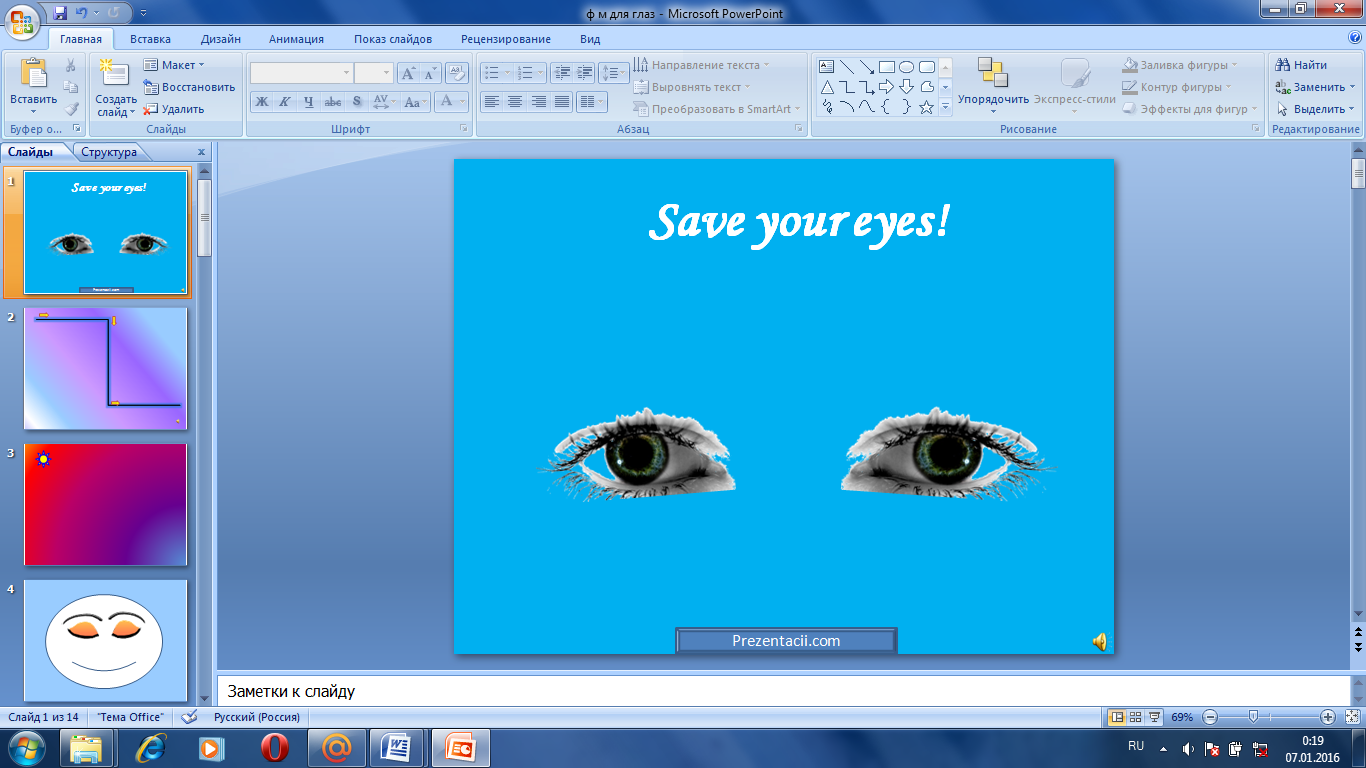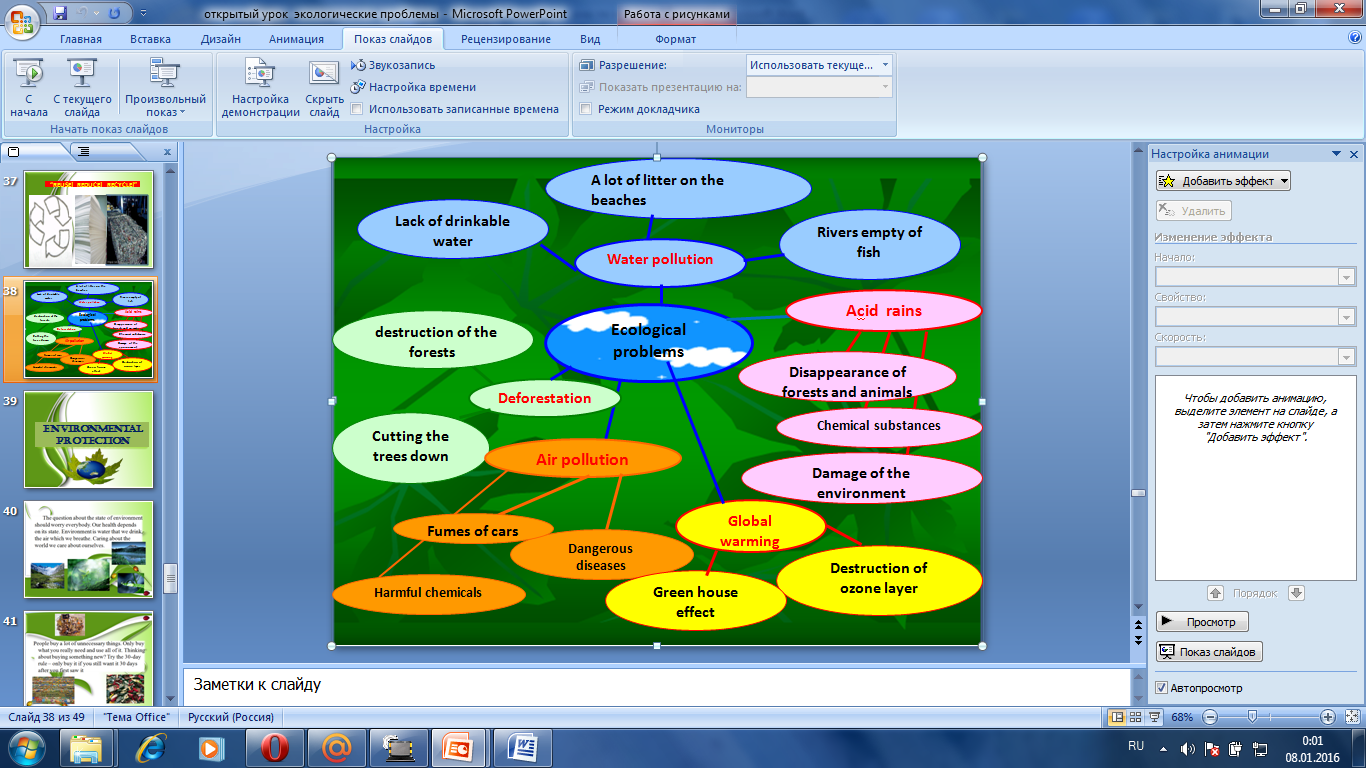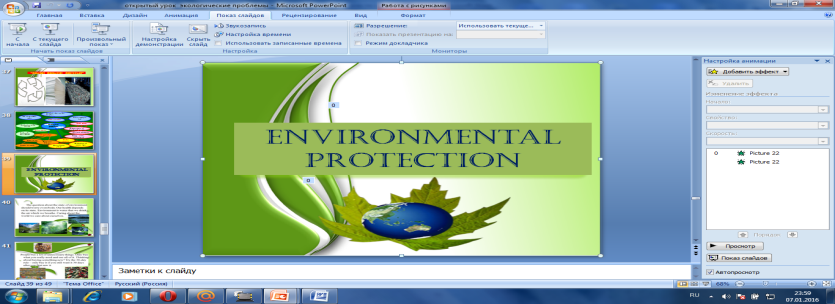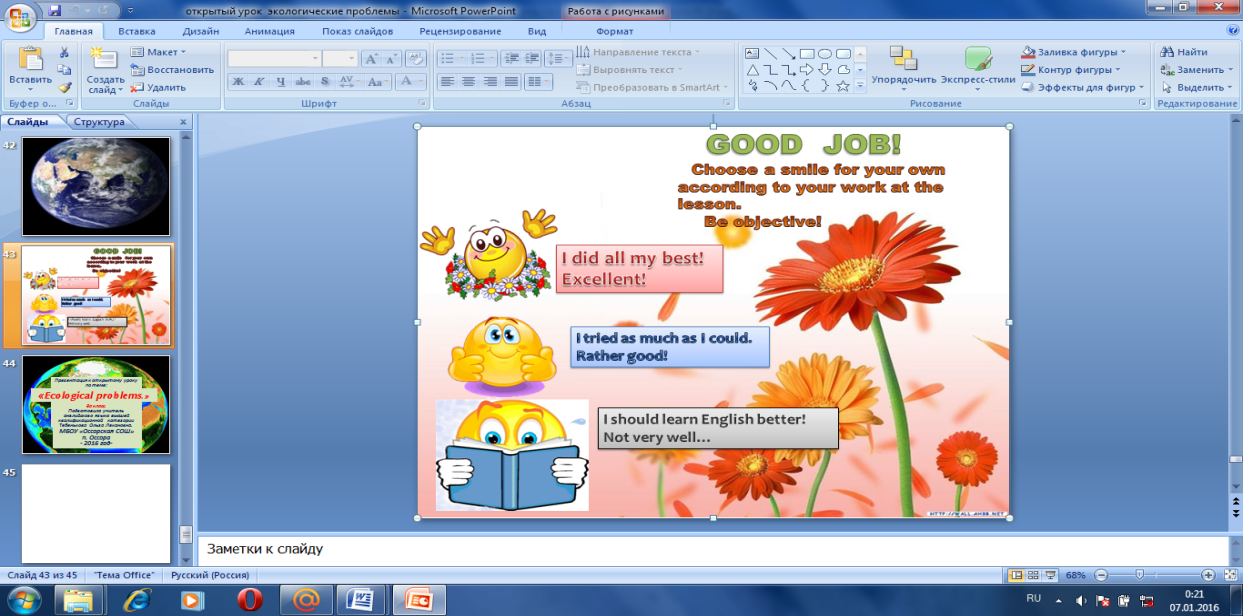- Учителю
- План-конспект открытого урока по английскому языку на темуEcological problems
План-конспект открытого урока по английскому языку на темуEcological problems
План - конспект открытого урока в 8 классе по теме:
« Ecological problems».
Цель: Привлечь внимание подростков к проблемам окружающей среды, выявить наиболее значимые проблемы экологии, способствовать развитию неравнодушного отношения к природе и её охране.
Задачи:
Образовательные: формирование коммуникативной компетентности, научиться дискуссировать по заданной теме, выражать свою точку зрения, умение анализировать и подводить итоги, отработать разговорные и лексико-грамматические навыки по теме.
Воспитательные: воспитание экологической культуры средствами английского языка.
Разивающие: развитие и совершенствование коммуникативных умений учащихся, самостоятельности и проектных навыков.
Личностные УУД
-сформированность потребности в самовыражении и самореализации, позитивной моральной самооценки и моральных чувств).
Коммуникативные УУД
- освоение начальных форм личностной рефлексии;
- определение общей цели и путей ее достижения; умение адекватно оценивать собственное поведение и поведение окружающих;
-активное использование речевых средств и средств информационных и коммуникационных технологий;
Познавательные УУД
- овладение способностью принимать и сохранять цели и задачи учебной деятельности,
- овладение понятиями, отражающими связи и отношения между объектами и процессами
Регулятивные УУД
- целеполагание как постановка учебной задачи на основе соотнесения того, что уже известно и усвоено учащимися, и того, что еще неизвестно;
- волевая саморегуляция как способность к мобилизации сил и энергии; способность к волевому усилию, к выбору ситуации мотивационного конфликта и к преодолению препятствий.
Метапредметный результат: овладение стратегиями критического мышления, использование разнообразных способов УУД.
Предметный результат: совершенствование иноязычной коммуникативной компетенции во всех её составляющих.
Личностный результат: становление личностной обоснованной позиции по исследуемым проблемам и личностных качеств.
Принципы обучения: активность, наглядность, доступность, учёт индивидуально-психологических особенностей учащихся, мотивация, сознательность, проблемность, коммуникативность.
Форма: Урок обобщения и применения полученных знаний.
Виды работы: индивидуальная, самостоятельная, групповая, фронтальная.
Тип урока: комбинированный
Используемые технологии: личностно-ориентированный подход, обучение в сотрудничестве, использование компьютерных технологий, технология критического мышления.
Оснащение: ноутбук, проектор, дидактический материал (карточки для индивидуальной и групповой работы), музыка.
Ход урока.
I.Организационный момент.
1. Приветствие.
Teacher: Good morning boys and girls! I am glad to see you! Take your seats!
II. Сообщение темы и плана урока. Целеполагание. (Вызвать устойчивый интерес к изучаемой теме, мотивировать ученика к учебной деятельности.)
Let's recite the poem "Save our planet". (yчащиеся по очереди декламируют стихотворение)
(слайд №2)
1.The fish in the sea are dying
From the pollution we create
We've got to stop polluting
Before it's too late.
2. Our planet is in trouble
It gets worse every day
We have to help our planet
In every possible way.
3. In the woods and forests
They are cutting down the trees
We've got to save the forests
Everyone agrees
4.The hole in the ozone layer
Is getting bigger every day
We've got to stop air pollution
We have to find a way.
Teacher: So, what global problems are we going to discuss at our lesson today?
(Yes, you are right- ecological) (слайд №3)
Teacher: (слайды № 4, 5, 6) Dear students, look at these amazing landscapes.
The world we live in is really wonderful: blue oceans, seas, rivers, snow-capped mountains, valleys and fields with aromatic and fragrant flowers. We all live surrounded by this beauty.
But, can you imagine that there might come a day when all this beauty will disappear? Of course, you can't. However, nature faces a great threat. (слайд № 7)
We should answer two main questions during our lesson:
1. Is the situation really so dangerous?
2. What can we do to protect nature?
Let's speak on the topic and try to persuade our guests that it is important to protect nature. I hope we shall find good ways of keeping our environment clean.
III. Овладение основными видами речевой деятельности. Актуализировать и обобщить имеющиеся у ученика знания.
1.Активизация лексики:
a) Puzzletime.Crossword. (фронтально) -5мин.
(В кроссворде зашифровано 10 слов по теме «Экология». Учащиеся находят слова. (They go across, down, and diagonal).
-
Q
W
E
B
X
O
S
W
U
O
P
L
A
N
E
T
A
I
R
G
Z
M
R
E
C
Y
C
L
E
Y
W
A
T
E
R
N
J
K
U
R
L
P
H
V
H
D
G
F
E
(слайд№8)
KEY: pollution, reduce, nature, disaster, ecology, planet, air, recycle, earth, water.
б) развитие навыков перевода (задание для слабых учеников)(2-3)
(Разделить учащихся на 2 группы, одной группе раздать карточки со словами и словосочетаниями на русском языке, другой на английском. Учащийся одной группы читает слово на русском, из другой группы встаёт ученик, у которого это же словосочетание на английском.
Student 1 (группа): защищать природу
Student 2 (2 группа): to protect nature
Student 3: загрязнять воздух
Student 4: to pollute the air
Student 5: выбрасывать
Student 6: to throw away и т. д
IV. Развитие навыков устной речи. (20 мин). Обсуждение экологических проблем.
Сообщение учащихся.
Teacher: You have read a lot about the environmental problems. Please, name the crucial or main ones.
Student1: air pollution
Student 2: water pollution
Student3: deforestation (disapparence of forests)
Student 4: global warming
Teacher: That's right. These are some of the world's most serious problems. (слайд № 9)
Teacher: Now tell us what the most serious problems are. Who would like to start?
Student 1: (слайды № 10, 11, 12) Now human beings are killing our planet. Pollution is very dangerous for people, wildlife and environment. The country air, once clean and fresh, now is polluted by power stations and factories. Every year people cut down trees, this leaves fewer fields and forests for animals to live in. (на слайде рисунок)
Millions of animals die every year because man has polluted their natural homes. We live in cities with exhaust - fumes of cars, and among littered streets, parks, rivers chocked with throwaway plastic and cellophane packaging.
(на слайде призыв: «Keep yourself informed about environmental problems.»)
Teacher: The next problem is deforestation. What do you know about it?
Student 2: (слайды № 13.14,15,16,17,18,19,20,21,22) All over the world forests are disappearing. People cut trees down because they need wood and paper or new places for farms and houses. Forests the size of Belguim are destroyed every year. It's an international disaster. Most of the pollution of the air comes from fires of forests. It manufactures carbon dioxide which causes the greenhouse effect and global warming. Don't forget that even if trees are planted, it takes many years for them to grow. Look! What can be done -Don't drop the cigarette butts in the forests or on the streets! (cлайд об охране леса)
V. Физкультминутка ( гимнастика для глаз).

Teacher: And what about water pollution? What can you say?
(cлайд загрязнение воды)
Student 3: (слайды № 23, 24, 25, 26, 27, 28) Water pollution is caused by dumping wastes into lakes, rivers, and other bodies of water. Harmful wastes may also get into the soil or drain off fields that have been sprayed with pesticides. Pesticides are often used to kill insects and weeds in cities or on farms. Polluted water can spread many diseases. In some rivers you can see foam caused by toxic chemical waste. Some of our rivers and lakes are now empty of fish. Forests, lakes, ponds, and other terrestrial and aquatic environments throughout the world are being severely damaged by the effects of acid rain. Acid rain is caused by the combination of sulfur dioxide and nitrogen compounds with water in the atmosphere. In addition to chemically burning the leaves of plants, acid rain poisons lake water, killing most, if not all, the aquatic inhabitants.
VI. Cообщение новой информации по теме: «Переработка мусора», осмысление её, соотношение с уже имеющимися знаниями.
Teacher: : People are polluting nature and influencing climate change!(на слайде призывы с лозунгами, ученики их зачитывают по очереди) (слайд № 29)
"Help to clean up your local environment."
" Try to save the earth right now"
"Avoid buying packed goods"
How can we do it? Why throw away? Why not recycle?
Student 4: (слайды № 30, 31,32, иллюстрирующий переработку мусора)
Many countries bury and forget about millions of tons of rubbish every year. It is known that in one year, a European family with two children throws away about 50 kilos of paper (that's six trees), and about 60 kilos of plastic. Take as much rubbish as you can to local recycling centers.
We can recycle most kinds of glass, metal and plastic. That saves energy and protects the environment. Many things that we throw away can still be useful. Use different bins for glass, paper and plastic! But only 4% of recyclable material is actually recycled. Recycling is expensive. But it saves trees and protects the environment from pollution.
Teacher: ( слайды № 33, 34, 35)Some of the packaging doesn't reach the bins. It becomes litter instead.
(слайд с таблицей о сроках хранения мусора)
Thrown away litter lasts from one month to 500 years without breaking down!
(cлайд № 36) с изображением мусора)
Put your litter in the bin! I think if people didn't throw away so much rubbish, the earth would be cleaner and healthier now.
Teacher: (слайды с лозунгами, призывающие к сохранению окружающей среды)
So, children I see that there are a lot of problems. What can we do to protect our earth? Can we do anything to help nature? What rule must we remember?
Students: (слайд № 37) (all together): "Reuse! Reduce! Recycle!" is the rule of 3 R's.
VII. Рефлексия. Обобщение полученной информации.
Формирование у каждого ученика собственного отношения к изучаемому материалу.
1.Составление кластера по теме « Экологические проблемы»

2. Приём мозгового штурма, учащиеся составляют советы по сохранению окружающей среды.
Teacher: Children, What can you advise people to keep our nature clean? Think for a few seconds and give your own ideas.
Учащиеся высказывают своё мнение, отвечают по очереди.
- Walk or cycle instead of using cars.
-When you are writing, use both sides of the paper.
-Clean the parks and streets in your town.
-Have a" Clean up Day", take your friends and families.
3.Презентация. (советы по сохранению окружающей среды.) (слайды № 39,40,41,42,43,44,45)

VIII. Музыкальная пауза. (слайд № 46)
Teacher: I want you to sing a song "Save Our Planet Earth" - together with Jimmy Cliff.
Save Our Planet Earth - Jimmy Cliff
Ding-ding-ding-ding-ding
Ding-ding-ding-ding-ding
Ding-ding-ding-ding-ding
Whoa-whoa-whoa-whoa-whoa
Ding-ding-ding-ding-ding
Ding-ding-ding-ding-ding
Ding-ding-ding-ding-ding
Whoa-whoa-whoa-whoa-whoa
Save our planet Earth! (a so we say, a so we say)
Save our planet Earth! (a so we say, a so we say)
Save our planet Earth! (a so we say, a so we say)
Hear what we're saying!
Save our planet Earth! (a so we say, a so we say)
You better STOP cutting down the forest
STOP, you're under arrest
STOP killing out animals
STOP, you are a criminal
We wanna live, we wanna love
We wanna see what life is worth (we wanna live)
The children wanna love, they wanna live
To see what life is worth (they wanna love)
We no want no more
Save our planet Earth! (a so we say, a so we say)
We want a better nation
Save our planet Earth! (a so we say, a so we say)
Save our planet Earth!
Inna this ya creation
Save our planet Earth! (a so we say, a so we say)
Everybody wants a better future
So we've got to stop this crying the nature
Every single one of us, you want to survive
So we've got to do the right things to stay alive
We wanna live, we wanna love
We wanna see what life is worth (we wanna live)
Hear what we say now!
We wanna live, we wanna love
We wanna see what life is worth (we wanna love)
Save our planet Earth! (a so we say)
Stop wha you a gwaan with on ya
Save our planet Earth! (a so we say, a so we say)
Ding-ding-ding-ding-ding
Ding-ding-ding-ding-ding
Ding-ding-ding-ding-ding
Whoa-whoa-whoa-whoa-whoa
Ding-ding-ding-ding-ding
Ding-ding-ding-ding-ding
Ding-ding-ding-ding-ding
Whoa-whoa-whoa-whoa-whoa
If you're a farmer, then what could you do?
If you're, what could you say?
We are not from another galaxy
Everybody got to live and this ya jam be free
Save our planet Earth!
IX. Подведение итогов урока. Оценивание. Домашнее задание. Прощание.
Teacher: Our lesson is coming to an end. We discussed some global problems. I hope the lesson was useful for you. (слайд №47)

Today you have got only good marks.
Your homework is to translate the song in rhyme and say what problems are touched upon in the song.
(слайд № 48)
Try to remember rules about how to protect nature. An outstanding English writer John Galsworthy said: " Let us think about the future. Let us keep our planet tidy and make it a better place to live in. Let us save the Earth for ourselves and for the next generations.
Teacher: See you next lesson. Bye!
Используемая литература:
1.Биболетова М.З., Трубанева Н.Н. Enjoy English. 8(Учебник для 8 класса общеобразовательных учреждений)/ Обнинск, Титул, 2014.
2. Учебно-методический журнал Английский язык. Первое сентября, сентябрь, 2013. С.17-21.
3.URL:best-mp3.ru/download.php?id=200803&ass=best-mp3.ru_jimmy_cliff_-_save_our_planet_earth.mp3&varin=test
4.www.wikepedia.ru
5."English language: reference book for the schoolchildren and students"/N.V.Beregovaya, N.G.Brusova/Moscow/Dropha/2000.
6."Ecology. School text-book"/ S.A.Bogolubov / Moscow/Znanie/ 1999.
7."Basis of ecology 10-11"/ N.M.Chernova / Moscow/Dropha/2001